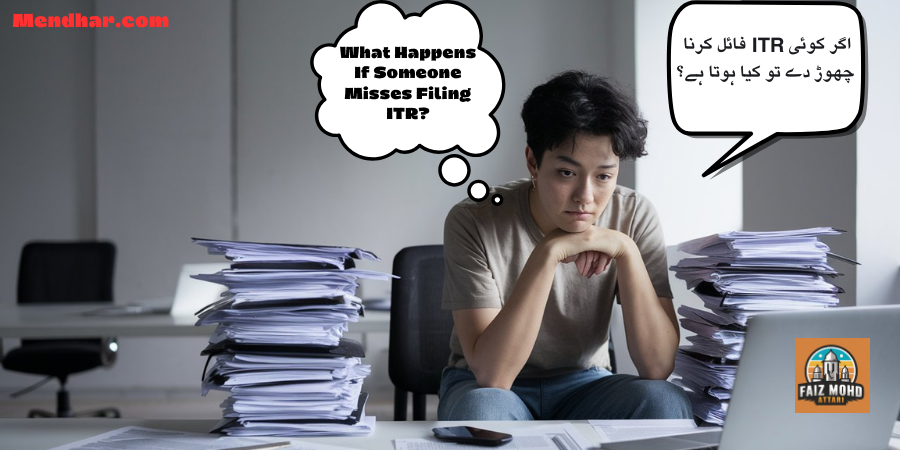Table of Contents
ToggleITR Deadline:What Happens if Someone Misses Filing ITR?

Missing the Income Tax Return (ITR) filing deadline can have serious implications. Understanding what happens if someone misses filing ITR is crucial for every taxpayer. This comprehensive guide outlines the consequences and steps to take if you find yourself in this situation.
Financial Penalties:
One of the primary consequences of missing the ITR filing deadline is the imposition of financial penalties. Under Section 234F of the Income Tax Act, a late filing fee is charged. For returns filed after the due date but before December 31 of the assessment year, a penalty of ₹5,000 is levied. However, if the ITR is filed after December 31, the penalty increases to ₹10,000. For small taxpayers whose income does not exceed ₹5 lakh, the maximum penalty is capped at ₹1,000. Thus, understanding what happens if someone misses filing ITR includes recognizing the immediate financial burden of these penalties.
Interest on Tax Due:
Beyond penalties, another significant repercussion of missing the ITR filing deadline is the interest levied on any outstanding tax liability. Under Section 234A, interest at the rate of 1% per month or part thereof is charged on the unpaid tax amount from the original due date until the date of actual filing. This can substantially increase the total tax payable, emphasizing the importance of timely filing. Therefore, a key aspect of what happens if someone misses filing ITR is the accrual of interest on any due taxes, compounding the financial strain on the taxpayer.
Loss of Carry Forward of Losses:
Taxpayers often rely on the benefit of carrying forward losses to offset future taxable income. However, missing the ITR filing deadline can forfeit this advantage. According to the Income Tax Act, certain losses, such as business loss and capital loss, can only be carried forward if the ITR is filed on or before the due date. This loss of tax planning opportunities is a crucial part of understanding what happens if someone misses filing ITR. It can significantly impact long-term tax strategies and financial planning.
Impact on Loans and Credit Score:
Missing the ITR filing deadline can also affect one’s ability to obtain loans. Financial institutions often require ITR documents as part of the loan approval process. A history of late filings can reflect poorly on your financial discipline, making it difficult to secure loans or leading to higher interest rates. Additionally, while not directly affecting credit scores, the inability to provide ITR documents can indirectly impact your financial credibility. Hence, another dimension of what happens if someone misses filing ITR is the potential difficulty in accessing financial services and maintaining a good credit profile.

Legal Repercussions:
In extreme cases, persistently missing ITR filing deadlines can lead to legal action. The Income Tax Department may issue notices, conduct audits, or even initiate prosecution for willful default. Penalties for such offenses can include imprisonment ranging from three months to two years, along with fines. For larger amounts of tax evasion, imprisonment can extend up to seven years. Thus, the legal ramifications are a severe aspect of what happens if someone misses filing ITR, underscoring the importance of compliance with tax regulations.
Loss of Interest on Refund:
For taxpayers entitled to a refund, filing ITR after the due date can result in a loss of interest on the refund amount. The Income Tax Department pays interest on the refund due from the date of filing the return or the end of the assessment year, whichever is later. Delayed filing thus reduces the period for which interest is paid, diminishing the refund amount. This is a critical consideration in understanding what happens if someone misses filing ITR, as it affects the financial benefits expected from timely tax compliance.
Rectification and Belated Filing:
All is not lost if you miss the ITR filing deadline. The Income Tax Act allows for the belated filing of returns under Section 139(4). This can be done before the end of the assessment year or before the completion of the assessment, whichever is earlier. However, belated filing does not exempt one from penalties and interest. It is a remedial measure rather than a solution. Additionally, rectifying mistakes in belated returns can be cumbersome. Therefore, an essential part of what happens if someone misses filing ITR is knowing the options for belated filing and the limitations that come with it.
In conclusion, the consequences of missing the ITR filing deadline are multifaceted, encompassing financial penalties, interest on due taxes, loss of benefits, and potential legal action. It is vital to understand what happens if someone misses filing ITR to navigate the repercussions effectively and take corrective measures promptly. Timely filing ensures compliance, financial benefits, and peace of mind, making it a crucial aspect of responsible financial management.

